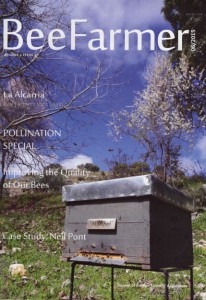 Tony Maggs and Ricky Wilson report on the Bee Farmers’ Association visit to Spain in March 2015
Tony Maggs and Ricky Wilson report on the Bee Farmers’ Association visit to Spain in March 2015
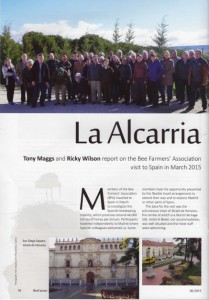 Members of the Bee Farmers’ Association (BFA)travelledto Spain in March to investígate the
Members of the Bee Farmers’ Association (BFA)travelledto Spain in March to investígate the
Spanish beekeeping industry, which produces around 44,000 tonnes of honey per annum. Participants travelled independently to Madrid where Spanish colleagues welcomed us. Some members took the opportunity presented by the flexible travel arrangements to extend their stay and to explore Madrid or other parts of Spain.
The base for the visit was the picturesque town of Alcalá de Henares, the centre of which is a World Heritage Site. Hotel el Bedel, our accommodation, was well situated and the hotel staff were welcoming.
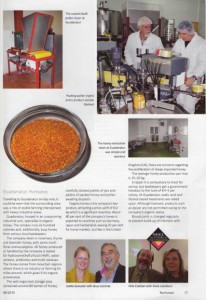 Guadanatur, Humanes
Guadanatur, Humanes
Travelling to Guadanatur on day one, it could be seen that the surrounding área
was a mix of arable farming interspersed with heavy industrial áreas. Guadanatur, housed ¡n an unassuming industrial unit, specialise in organic honey. The comany runs six hundred colonies and, additionally, buys honey from various local beekeepers. The company deals in rosemary, thyme and lavender honey, with some multifloral and eucalyptus. All honey produced or handled by the company is tested for hydroxymethylfurfural (HMF), water content, antibiotics and multi-residues. The honey comes from mountain regions where there is no industry or farming for miles around, which gives it its organic provenance.
The well-organised storage área contained around 80 barréis of honey, carefully stacked pallets of jars and pallets of packed honey and pollen awaiting dispatch. Organic honey is the company’s key product, attracting a price uplift of €1/kg which is a significant incentive. About 80 per cent of the company’s honey is exported to countries such as Germany, Japan and Switzerland, leaving 20 per cent for home markets. Just like in the United Kingdom (UK), there are concerns regarding the proliferation of cheap imported honey.
The average honey production per hive is 15-20 kg.
In Spain it is compulsory to treat for varroa, but beekeepers get a government handout to the tune of €4-5 per colony. At Guadanatur, oxalic acid and thymol-based treatments are relied upon. Although licensed, producís such as Apivar are not permitted owing to the company’s organic status.
Brood comb is changed regularly to prevent build-up of infection with Nosema ceranae. HiveAlive™ is also used regularly and owner Pablo Laguna is very impressed with the results. He explained that in Spain it is not uncommon to have 40 per cent colony mortality, mainly due to Nosema ceranae, but the company’s results show the positive effect of the treatment.
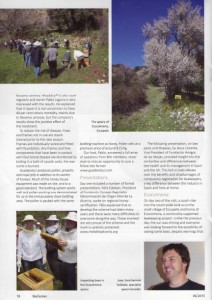 To reduce the risk of disease, hives and frames not in use are steam cleaned prior to the new season. Frames are individually wired and fitted with foundation. Any frames and hive components that have been ¡n contact with foul brood disease are disinfected by boiling in a bath of caustic soda; the wax comb is burned.
To reduce the risk of disease, hives and frames not in use are steam cleaned prior to the new season. Frames are individually wired and fitted with foundation. Any frames and hive components that have been ¡n contact with foul brood disease are disinfected by boiling in a bath of caustic soda; the wax comb is burned.
Guadanatur produces pollen, propolis and royal jelly in addition to its variety of honeys. Much of the honey house equipment was made on site, and to a good standard. The bottling system works well and pollen-packing was demonstrated for us in the immaculately deán bottling área. The pollen is packed with the same bottling machine as honey. Pollen sells at a premium price of around €15/kg.
Our host, Pablo, answered a full array of questions from BFA members, never slow to miss an opportunity to quiz a fellow bee farmer.
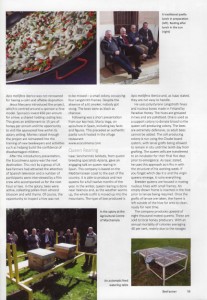 Presentations
Presentations
Day one included a number of formal presentations. Félix Esteban, President of Fundación Consejo Regulador Denominación de Origen Miel de La Alcarria, spoke on regional honey certification. Félix explained that to develop the scheme had taken many
years and there were many difficulties to overeóme along the way. Those involved are very proud of the scheme and the mark is carefully protected. www.mieldelaalcarria.org
The following presentaron, on bee pests and diseases, by Jesús Llórente, Vice President of Fundación Amigos de las Abejas, provided insight into the similarities and differences between bee health and its managament in Spain and the UK. This led to lively debate over the benefits and disadvantages of compulsory registration for beekeepers, a key difference between the industry in Spain and here at home.
Ecocolmena
On day two of the visit, a coach ride into the countryside took us to the small village of Escopete and home of ecocolmena, a community-supported beekeeping project. Unlike the previous day, the sun was shining and everyone was looking forward to the possibility of seeing some bees, despite warnings that Apis mellifera ibérica was not renowned for having a calm and affable disposition. Jesús Manzano introduced the project, which is centred around a sponsor-a-h¡ve model. Sponsors invest €60 per annum for a hive; a shared holding costing less. This gives an entitlement to 15 jars of honey per annum and the opportunity to visit the sponsored hive within its apiary setting. Monies raised through the project are reinvested into the training of new beekeepers and activities such as helping build the confldence of disadvantaged children. Afterthe introductory presentaron, the Ecocolmena apiary was the next destination. This visit by a group of UK bee farmers had attracted the attention of Spanish televisión and a number of participants were interviewed by a film crew who accompanied us for the next hour or two. In the apiary, bees were active, collecting pollen from almond blossom and wild thyme. Of course, the opportunity to inspect a hive was not to be missed – a small colony occupying four Langstroth frames. Despite the absence of a lit smoker, nobody got stung. The bees were as black as charcoal. Following was a short presentaron from our key host, María Vega, on apiculture in Spain, including key facts and figures. This preceded an authentic paella lunch hosted in the village restaurant. www.ecocolmena.com
Queen Rearing
Isaac Senchermés Soldado, from queen breeding specialists Apiaria, gave an
engaging talk on queen rearing in Spain. This company is based on the Mediterranean coast to the east of the country. It is able to produce and rear queens for a full twelve months of the year. In the winter, queen rearing is done near Valencia and, as the weather warms up, the whole outfit is moved up into the mountains. The type of bee produced is Apis mellifera ibérica and, as Isaac stated, they are not easy to handle. He uses polystyrene Langstroth hives and nucleus boxes made in Finland by Paradise Honey. The hives are grouped in two and are palletised. One is used as a support colony to dónate brood to the queen cell-producing colony. The bees are extremely defensive, so adult bees cannot be added. The cell-producing colony is run using the Cloake board system, with larval grafts being allowed to remain in situ until the tenth day from grafting. The queen cells are transferred to an incubator for their final five days prior to emergence. As Isaac stated, he uses this approach as ¡t fits in with the structure of his working week. If you forget which day it is and the virgin queens emerge, it ruins everything.
Breeder queens are housed in mating nucleus hives with small frames. An empty drawn frame is inserted in the hiveprior to larvae being required. Once the grafts of larvae are taken, the frame is left outside of the hive for ants to clean, ready for next time. The company produces upward of eight thousand mated queens. These are sold to local honey producers. With an annual mortality of colonies averaging 40 per cent, mainly due to the ravages of Nosema ceranae, Spanish beekeepers really need these queens to recover their losses. This year, Isaac has ¡ncreased his price for queens to €15 each. www.apiaria.es
Following was a short talk on urban beekeeping, which is banned in built-up áreas throughout Spain. A major change to legislation would be required to lift this ban and there is a growing movement pressurising the powers that be to do so.
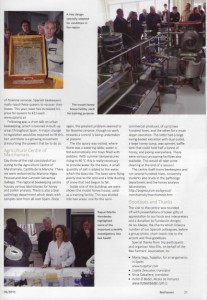 Agricultural Centre of Marchámalo
Agricultural Centre of Marchámalo
Day three of the visit consisted of an outing to the Agriculture Centre of Marchámalo, Castilla de la Mancha. There we were welcomed by Mariano Higes Pascual and José Carmelo Salvachúa Gallego. The regional beekeeping centre houses various laboratories for honey and pollen analysis. There is also a bee pathology department which deals with samples sent from all over Spain. Once again, the greatest problem seemed to be Nosema ceranae, though no work towards a control is being undertaken at present. The site apiary was visited, where there was a watering table; water is fed automatically into trays filled with pebbles. With summertemperatures rising to 40 °C this is really necessary to provide water for the bees. A small quantity of salt is added to the water, which the bees like. The bees were flying poorly due to the cold and a little dusting of snow that had begun to fall. Inside one of the buildings we were shown the model honey house, used as a training facility. This was divided into two áreas: one for the semi-commercial producer, of up to two hundred hives, and the other for a much larger operation. The latter had a large swing-basket extractor with dual outlet, a large honey sump, wax spinner, baffle tank that could hold half a tonne of honey, and piping everywhere. There were various uncapping facilities also available. This would all take some cleaning atthe end of a season! The centre itself trains beekeepers and run several hundred hives. University students also study in the pathology department and the honey analysis laboratories. http://pagina.jccm.es/agricul/marchamalo/marchamalo.htm
Goodbyes and Thanks
The visit to the centre was rounded off with presentations of token gifts of
appreciation to our hosts and interpreters and a donation to Fundación Amigos de las Abejas, the charity which linked a number of our Spanish colleagues, before a group photo, short coach ride to the airport and final goodbyes. Special thanks from trip participants and organiser Alex Ellis, on behalf of the Bee Farmers’ Association, to:
• Maria Vega, Tuapitur, for arrangements in Spain.
www. tuapitur. com
• Lisette Zewuster, translator
• Silvia Caballero, translator
• Hotel El Bedel, Alcalá de Henares
www.hotelelbedel.com
El evento fue organizado por María Vega, de ‘Tuapitur’, junto con Jesús Manzano, de ‘Ecocolmena’, ambos patronos de la ‘Fundación Amigos de las Abejas’
